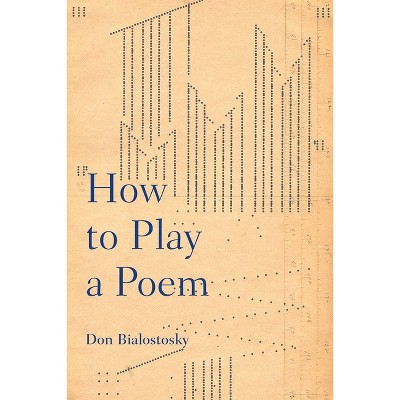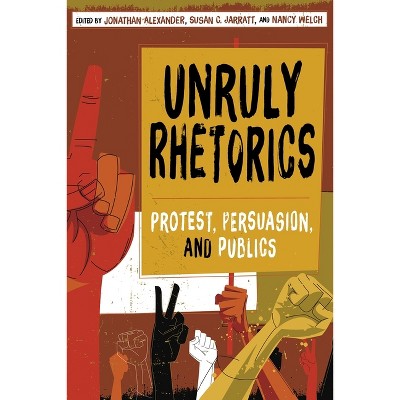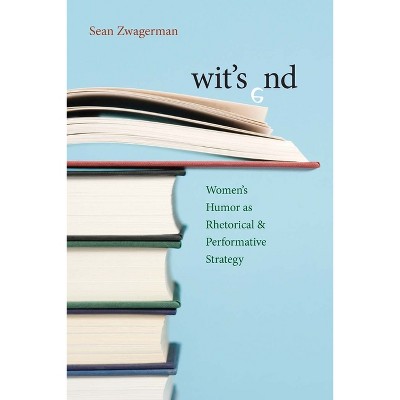Composition In The University - (Composition, Literacy, and Culture) by Sharon Crowley (Paperback)

$55.00 when purchased online
Target Online store #3991
About this item
Highlights
- Composition in the University examines the required introductory course in composition within American colleges and universities.
- About the Author: Sharon Crowley is professor of English at Arizona State University.
- 240 Pages
- Language + Art + Disciplines, Composition + Creative Writing
- Series Name: Composition, Literacy, and Culture
Description
About the Book
Composition in the University examines the required introductory course in composition within American colleges and universities. Crowley argues that due to its association with literary studies in English departments, composition instruction has been inappropriately influenced by humanist pedagogy and that modern humanism is not a satisfactory rationale for the study of writing. Crowley envisions possible nonhumanist rationales that could be developed for vertical curricula in writing instruction, were the universal requirement not in place. Winner, 1998 MLA Mina P. Shaughnessy PrizeBook Synopsis
Composition in the University examines the required introductory course in composition within American colleges and universities. Crowley argues that due to its association with literary studies in English departments, composition instruction has been inappropriately influenced by humanist pedagogy and that modern humanism is not a satisfactory rationale for the study of writing. Crowley envisions possible nonhumanist rationales that could be developed for vertical curricula in writing instruction, were the universal requirement not in place.Composition in the University examines the required introductory course in composition within American colleges and universities. According to Sharon Crowley, the required composition course has never been conceived in the way that other introductory courses have been--as an introduction to the principles and practices of a field of study. Rather it has been constructed throughout much of its history as a site from which larger educational and ideological agendas could be advanced, and such agendas have not always served the interests of students or teachers, even though they are usually touted as programs of study that students u201cneed.u201d If there is a master narrative of the history of composition, it is told in the institutional attitude that has governed administration, design, and staffing of the course from its beginnings--the attitude that the universal requirement is in place in order to construct docile academic subjects.
Crowley argues that due to its association with literary studies in English departments, composition instruction has been inappropriately influenced by humanist pedagogy and that modern humanism is not a satisfactory rationale for the study of writing. She examines historical attempts to reconfigure the required course in nonhumanist terms, such as the advent of communications studies during the 1940s. Crowley devotes two essays to this phenomenon, concentrating on the furor caused by the adoption of a communications program at the University of Iowa. Composition in the University concludes with a pair of essays that argue against maintenance of the universal requirement. In the last of these, Crowley envisions possible nonhumanist rationales that could be developed for vertical curricula in writing instruction, were the universal requirement not in place. Crowley presents her findings in a series of essays because she feels the history of the required composition course cannot easily be understood as a coherent narrative since understandings of the purpose of the required course have altered rapidly from decade to decade, sometimes in shockingly sudden and erratic fashion. The essays in this book are informed by Crowleyu2019s long career of teaching composition, administering a composition program, and training teachers of the required introductory course. The book also draw on experience she gained while working with committees formed by the Conference on College Composition and Communication toward implementation of the Wyoming Resolution, an attempt to better the working conditions of post-secondary teachers of writing.
Review Quotes
A must read, not only for everyone working in rhetoric and composition but for anyone interested in the future of U.S. higher education. This remarkable book challenges unexamined assumptions both inside and outside the field of composition studies and suggests provocative solutions to institutional problems plaguing the academic humanities. It will surely be controversial; but whether readers agree or disagree with Crowley, they will certainly learn from her detailed historical analyses and wide-ranging political critiques.-- "Steven Mailloux, University of California-Irvine"
Each of these essays on composition history and pedagogy in universities is a rich source of new research on actual practices in teaching literature and composition and the cultural and intellectual contexts in which their institutional cooperation has developed. But taken together, these essays also expose the devotion in composition studies to developing students' hermeneutic consciousness, not their rhetorical acumen. Crowley's astute analysis invites all in departments of English to critique--and in the coming century finally to forego--the illogic that requires writing courses that are neither teaching the production of contemporary texts nor aiming to do so.-- "Susan Miller, University of Utah"
Interesting and compelling.-- "Kathryn Flannery, University of Indiana"
With her 'modest proposal, ' Crowley calls for a radical redefinition of college English. With the lifting of the first-year composition requirement, teachers will no longer be forced by supply and demand to labor under exploitative conditions. . . . Freed from the conception of composition as remedial gatekeeping, writing instruction can be destandardized, unleashing the disciplinary and professional knowledge of those who profess it. . . . Our responses to Crowley's . . . proposal will inevitably be shaped by our places in the profession. . . . Whatever your own position [Composition in the University] will teach you something useful, and perhaps discomforting.-- "Rhetoric Review"
About the Author
Sharon Crowley is professor of English at Arizona State University. She is the author of Composition in the University, The Methodical Memory, and the textbook Ancient Rhetorics for Contemporary Students.Dimensions (Overall): 9.29 Inches (H) x 6.18 Inches (W) x .79 Inches (D)
Weight: 1.06 Pounds
Suggested Age: 22 Years and Up
Number of Pages: 240
Genre: Language + Art + Disciplines
Sub-Genre: Composition + Creative Writing
Series Title: Composition, Literacy, and Culture
Publisher: University of Pittsburgh Press
Theme: General
Format: Paperback
Author: Sharon Crowley
Language: English
Street Date: May 28, 1998
TCIN: 1005873178
UPC: 9780822956600
Item Number (DPCI): 247-12-2441
Origin: Made in the USA or Imported
Shipping details
Estimated ship dimensions: 0.79 inches length x 6.18 inches width x 9.29 inches height
Estimated ship weight: 1.06 pounds
We regret that this item cannot be shipped to PO Boxes.
This item cannot be shipped to the following locations: American Samoa (see also separate entry under AS), Guam (see also separate entry under GU), Northern Mariana Islands, Puerto Rico (see also separate entry under PR), United States Minor Outlying Islands, Virgin Islands, U.S., APO/FPO
Return details
This item can be returned to any Target store or Target.com.
This item must be returned within 90 days of the date it was purchased in store, shipped, delivered by a Shipt shopper, or made ready for pickup.
See the return policy for complete information.











